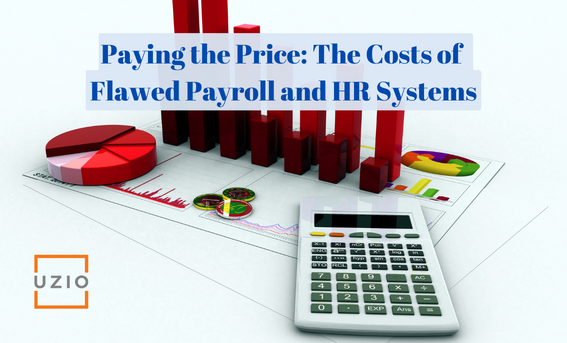
What is the cost of an inefficient Payroll and HR software system?
Quick links
-
Introduction
-
The Immediate Costs of Inefficient Payroll Systems
-
Long-Term Financial Implications
-
Operational Impacts of Inefficient Payroll and HR Systems
-
Employee Satisfaction and Retention: The Hidden Costs of Inefficient Systems
-
Security Risks and Data Management: The Hidden Dangers of Inefficient Systems
-
Conclusion
1. Introduction
In the bustling world of small to medium-sized businesses (SMBs), efficiency isn’t just a buzzword—it’s the backbone of successful operations. Yet, when it comes to payroll and human resources (HR) systems, many SMB owners underestimate the significant impact these tools can have on their business’s bottom line and overall health. Often perceived as mere administrative tools, payroll and HR systems play a crucial role in ensuring operational efficiency, compliance, and employee satisfaction.
The Cost of Complacency
Many SMBs continue to rely on outdated or manual payroll processes under the assumption that the costs associated with upgrading to a modern system are unjustifiable. This perspective, however, overlooks the hidden costs of inefficiency that can accumulate over time, eating into profits and hampering growth. From the direct financial losses due to payroll errors and compliance penalties to more insidious costs like lost opportunities and reduced employee morale, the stakes are high.
The Value of Investment
Investing in an efficient payroll/HR system isn’t just about automating calculations or storing employee records; it’s about securing a strategic asset for your business. Modern payroll systems enhance decision-making, streamline operations, safeguard against compliance risks, and improve employee engagement—all of which are essential for staying competitive in today’s fast-paced business environment.
In this blog, we will uncover the often-overlooked costs of sticking with an inefficient payroll/HR system and discuss how making the switch to a modern solution can not only mitigate these costs but also add significant value to your business. Whether you are a new business owner assessing initial setup options or an established business looking to upgrade, understanding these dynamics is crucial.
2. The Immediate Costs of Inefficient Payroll Systems
When payroll systems fall short of efficiency, the consequences can manifest swiftly and starkly. Here’s how inefficiencies in payroll can directly impact your SMB’s finances:
Payroll Errors: A Costly Affair
- Direct Financial Impact: Errors in payroll, such as overpayments and underpayments, are not only a headache to rectify but also carry a direct cost. Correcting these errors involves administrative time, potential legal fees, and sometimes penalties if the errors affect tax filings or employee benefits.
- Example: Consider an overpayment error that goes unnoticed for months. The cumulative overpayment amount, coupled with the resources required to recover these funds or adjust future payments, can be significant.
Compliance Penalties: More Common Than You Think
- Legal and Regulatory Risks: Inefficient payroll systems often struggle to keep up with ever-changing tax laws and employment regulations. This lag can result in non-compliance, leading to fines and penalties that can be substantial.
- Illustration: If payroll fails to incorporate a new state tax regulation, the result could be a series of incorrect tax submissions that, once audited, result in hefty fines and a damaged reputation.
Lost Employee Trust and Satisfaction
- Impact on Work Culture: Frequent payroll issues can erode employee trust and satisfaction, crucial components of a productive workplace.
- Consequence: An SMB with recurring payroll problems may see a rise in employee turnover or difficulty attracting quality talent, which further translates into increased hiring and training costs.
Case Point: Real-World Impact
- Scenario: A small retail business experienced regular discrepancies in payroll due to an outdated system, leading to repeated employee complaints and two valued staff members quitting. The subsequent recruitment and training process for new employees resulted in additional unplanned expenditures that significantly impacted the business’s budget.
3. Long-Term Financial Implications
While immediate costs can be quantified relatively easily, the long-term financial impacts of an inefficient payroll and HR system are often more insidious but no less damaging. Here’s how these inefficiencies can erode your business’s financial health over time:
Increased Operational Costs
- Continual Waste: Inefficiencies in payroll systems lead to ongoing increased operational costs. Whether it’s due to additional staffing requirements to manage payroll complexities or the need for regular manual interventions, these costs accumulate, impacting your bottom line.
- Example: A company might need to employ extra part-time staff to handle the increased workload during payroll processing weeks, significantly increasing labor costs.
Opportunity Costs
- Redirected Resources: The time and resources spent managing an inefficient system could be better utilized in areas that contribute directly to business growth, such as sales, customer service, or product development.
- Impact Analysis: If management spends an average of five hours a week addressing payroll discrepancies and system issues, that amounts to over 250 hours a year that could have been spent on strategic planning or revenue-generating activities.
High Turnover Rates
- Cost of Turnover: Inefficient payroll systems often lead to employee dissatisfaction, which can increase turnover rates. The costs associated with recruiting, hiring, and training new employees can be substantial and recur more frequently in environments with payroll issues.
- Illustration: Regular turnover due to payroll dissatisfaction can cost an SMB approximately 20% of each lost employee’s annual salary, a significant financial burden for any business.
Deferred System Upgrades
- Delayed Investments: Continually patching an outdated system instead of investing in a modern solution can lead to higher costs in the long run. These include not only maintenance fees but also missed opportunities for more significant efficiency gains from newer technologies.
- Scenario: An SMB persists with an outdated payroll system, spending thousands annually on maintenance, whereas investing in a new system could reduce overall costs and improve efficiencies.
Reputational Damage
- Market Perception: Inefficient payroll processing can damage your business’s reputation, affecting client and partner trust. This reputational damage can translate into lost business opportunities and revenue.
- Real-World Example: A business known for frequent payroll errors may find it challenging to recruit top talent or retain clients, leading to decreased market competitiveness and revenue.
4. Operational Impacts of Inefficient Payroll and HR Systems
An inefficient payroll and HR system not only strains finances but also hampers the day-to-day operations of an SMB. The ripple effects of these operational inefficiencies can be extensive, affecting various aspects of business management. Here’s how:
Increased Administrative Burden
- Continuous Oversight Required: Inefficient systems demand constant attention and manual intervention, which significantly increases the administrative workload.
- Example: Frequent manual checks and adjustments to payroll calculations can consume substantial hours that could be better spent on more productive activities.
Error Management and Corrections
- Resource Drain: The need to regularly address errors in payroll processing occupies valuable HR and accounting resources, diverting attention from strategic tasks.
- Impact Analysis: Correcting payroll errors often involves not just the HR department but also IT support and upper management, leading to a compounded diversion of effort.
Data Integrity and Accessibility Issues
- Inconsistent Data Management: Outdated or inefficient systems often struggle with maintaining the integrity and accessibility of data, which is crucial for accurate reporting and decision-making.
- Consequence: Poor data quality can lead to flawed business insights and decisions, potentially affecting every department within the organization.
Process Delays and Inefficiencies
- Workflow Disruptions: Inefficient payroll and HR systems can cause delays in processing, which in turn can delay the entire payroll schedule, affecting employee satisfaction and compliance.
- Scenario: Delays in payroll processing can lead to late payments, impacting employee morale and possibly incurring penalties for late tax filings.
Lack of Integration with Other Systems
- Isolated Systems: An inefficient payroll system often lacks the capability to integrate seamlessly with other business management tools, which is essential for streamlined operations.
- Illustration: Difficulty in integrating payroll data with accounting software can lead to extra work in reconciling financial records, increasing the risk of errors.
Scalability Constraints
- Inhibiting Growth: As businesses grow, their needs change. An inefficient system may not scale well with the business, leading to bottlenecks and further inefficiencies.
- Example: An SMB expanding to multiple locations might find that its current payroll system cannot handle multi-state tax compliance, leading to additional complexities and potential legal issues.
5. Employee Satisfaction and Retention: The Hidden Costs of Inefficient Systems
An often overlooked consequence of an inefficient payroll and HR system is its impact on employee satisfaction and retention. Employees are the backbone of any business, and their engagement directly affects productivity and workplace morale. Here’s how inefficient systems can erode these crucial aspects:
Frequent Payroll Errors Undermine Trust
- Immediate Impact: Errors in payroll—such as delayed payments, incorrect deductions, or failure to properly calculate overtime—can significantly diminish employee trust in their employer.
- Long-term Consequences: Continued payroll issues not only cause frustration and dissatisfaction but can also lead to higher turnover rates, as employees seek more reliable workplaces.
Inadequate HR Processes Dampen Employee Engagement
- HR Inefficiencies: Cumbersome and outdated HR processes, such as manual handling of leave requests or benefits management, can frustrate employees, leading to decreased engagement.
- Example: If employees consistently face difficulties accessing their leave balances or experience delays in responses to HR queries, their overall perception of the company’s efficiency and care for its workforce diminishes.
Limited Access to Self-Service Options
- Modern Expectations: Today’s workforce expects modern conveniences like digital access to payroll information, benefits management, and personal data updates through self-service portals.
- Impact of Inefficiencies: An inefficient system that lacks these capabilities can make employees feel disconnected and unsupported, which can negatively impact their engagement and satisfaction.
Implications for
Career Development
- Growth Opportunities: Efficient HR systems help manage and track career development opportunities, training programs, and promotions.
- Stagnation from Inefficiencies: Without an effective system, employees may find it difficult to see a clear path for advancement or access necessary training, leading to feelings of stagnation and dissatisfaction.
Cultural Impact
- Workplace Environment: The efficiency and effectiveness of payroll and HR systems are often seen as a reflection of the company’s values and operational competence.
- Broader Implications: Inefficient systems can contribute to a culture of disorganization and neglect, which can permeate other aspects of the organization, affecting overall company culture and employee morale.
Recommended Reading: Biggest pain point with Payroll and HR software
6. Security Risks and Data Management: The Hidden Dangers of Inefficient Systems
Inefficient payroll and HR systems are not just operationally cumbersome—they can also expose businesses to significant security risks and data management challenges. In an era where data breaches are increasingly common and exceedingly costly, ensuring the integrity and security of employee data is paramount. Here’s how outdated or inefficient systems might compromise your business:
Vulnerability to Data Breaches
- Increased Risk: Older or inefficient systems often lack the latest security updates and advanced protections against cyber threats, making them vulnerable to breaches.
- Consequences: A data breach can lead to severe financial penalties, loss of trust among employees and customers, and potentially catastrophic reputational damage.
Compliance Failures
- Regulatory Requirements: Businesses are required to comply with various data protection regulations, such as GDPR in Europe and similar laws in other regions.
- Impact of Non-Compliance: Inefficient systems may fail to meet these regulatory standards, resulting in hefty fines and legal challenges that can strain a business financially and distract from its core operations.
Inefficient Data Management
- Poor Integration: Inefficient payroll systems often struggle with integrating smoothly with other business systems, leading to data silos and inconsistencies.
- Operational Delays: These inefficiencies can delay the flow of information, hindering timely decision-making and affecting overall business agility.
Inadequate Data Recovery Solutions
- Backup and Recovery: Outdated systems may not have robust backup and recovery processes, increasing the risk of data loss in the event of a system failure or cyberattack.
- Long-Term Implications: Losing critical payroll and HR data can disrupt business operations extensively and require significant resources to rectify.
Lack of User Access Control
- System Access: Inefficient systems often lack sophisticated user access controls, which can lead to unauthorized access to sensitive information.
- Internal Threats: Without proper controls, the risk of internal data misuse or theft increases, posing yet another security challenge for businesses.
7. Conclusion
The journey through understanding the hidden costs of inefficient payroll and HR systems and the numerous benefits of upgrading to modern, integrated solutions highlights a clear path forward for SMBs. By making this strategic shift, businesses not only streamline operations but also enhance compliance, improve employee satisfaction, and secure a competitive edge in an increasingly digital marketplace.
Don’t let inefficiency slow down your business progress. Investing in UZIO is not just about upgrading technology—it’s about setting your business up for future success with the latest advancements in AI and ML. Take action now to explore how UZIO can transform your operations, enhance employee engagement, and ensure compliance.
To know more about UZIO Payroll/HR solution and get in touch with us for an expert-led demo.





